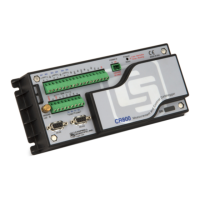Section 7. Installation
the CR200X) accept program files, or Include() instruction files, with .DLD
extensions.
Note Do not confuse CRBasic files with .DLD extensions with files of
.DLD type used by legacy Campbell Scientific dataloggers.
As an example, pseudo code using this feature might be written as:
Const Destination = LoggerType
#If Destination = 3000 Then
<code specific to the CR3000>
#ElseIf Destination = 1000 Then
<code specific to the CR1000>
#ElseIf Destination = 800 Then
<code specific to the CR800>
#ElseIf Destination = 6 Then
<code specific to the CR6>
#Else
<code to include otherwise>
#EndIf
For example, this logic allows a simple change of a constant to direct, which
measurement instructions to include.
CRBasic Editor features a pre-compile option that enables the creation of a
CRBasic text file with only the desired conditional statements from a larger
master program. This option can also be used at the pre-compiler command line
by using -p <outfile name>. This feature allows the smallest size program file
possible to be sent to the CR800, which may help keep costs down over very
expensive comms links.
CRBasic example Conditional Code
(p. 257) shows a sample program that
demonstrates use of conditional compilation features in CRBasic. Within the
program are examples showing the use of the predefined LoggerType constant
and associated predefined datalogger constants (6, 800, 1000, and 3000).
Conditional Code
'This program example demonstrates program compilation than is conditional on datalogger
'model and program speed. Key instructions include #If, #ElseIf, #Else and #EndIf.
'Set program options based on:
' LoggerType, which is a constant predefined in the CR800 operating system
' ProgramSpeed, which is defined in the following statement:
Const ProgramSpeed = 2
#If ProgramSpeed = 1
Const ScanRate = 1 '1 second
Const Speed = "1 Second"
#ElseIf ProgramSpeed = 2
Const ScanRate = 10 '10 seconds
Const Speed = "10 Second"

